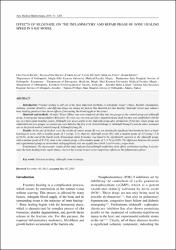EFFECTS OF SILDENAFIL ON THE INFLAMMATORY AND REPAIR PHASE OF BONE HEALING SPEED IN A RAT MODEL
Özet
Introduction: Fracture healing is still one of the most important problems in orthopedic surgery clinics. Alcohol consumption, smoking, systemic disorders, and different drugs are among the factors that diminish fracture healing. Sildenafil citrate may enhance bone healing speed as it has known effects of increasing the blood supply to the tissues. Materials and methods: 36 male, Wistar-Albino rats were randomly divided into two groups as the control group and sildenafil group. A retrograde intramedullary Kirschner (K)-wire was inserted, and then standard closed shaft fracture was established with the use of a three-point bending system. Sildenafil was given orally to the sildenafil group after production of fracture. Each group was subdivided into two groups; seventeen rats were killed at the first week (Control Group A; Sildenafil Group C) and the other seventeen rats at the fourth week (Control Group B; Sildenafil Group D). Results: At the end of the first week, the results of control group (B) was not statistically significant but trended to have a better histological score, with a median grade of 5 (range: 2-5), than the sildenafil group (D), with a median grade of 3.5 (range: 2-5) (p=0.16). At the end of the fourth week, histological callus formation was found to be significantly superior in the sildenafil group, with a median grade of 8 (5-9), than in the control group, with a median grade of 5 (5-7) (p=0.02). The difference between the control and experimental groups as determined radiographically was not significant at both 1 and 4 weeks, respectively. Conclusions: The microscopic results of this study indicate that sildenafil might have dual effects on fracture healing. It accelerates the bone healing in the repair phase, where it has a trend to have some suppressive effects on the inflammatory phase.


















